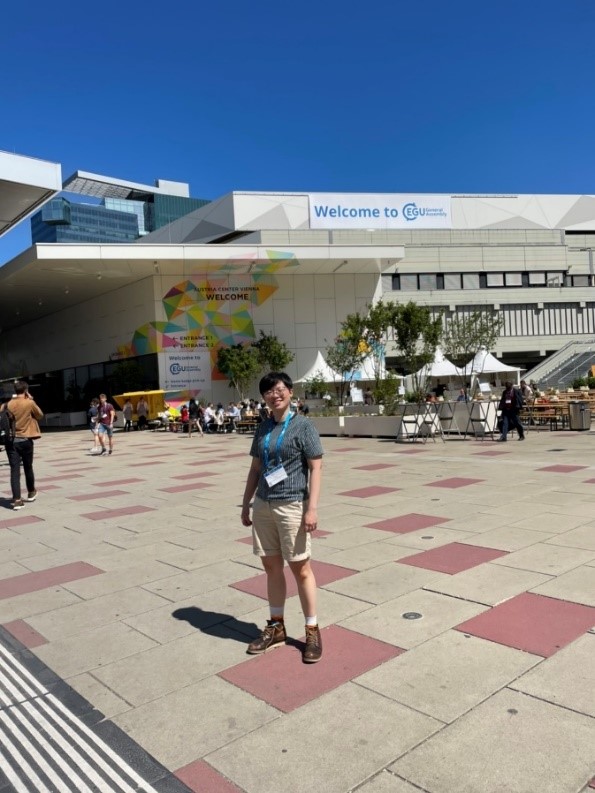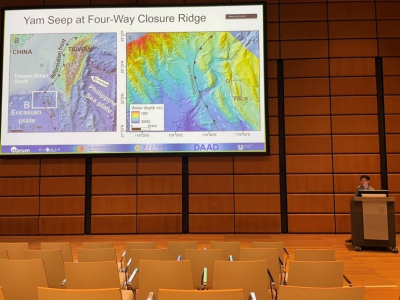Bremen International Graduate School for Marine Sciences
Yiting Tseng
Report of GLOMAR PhD student Yiting Tseng about her participation in the EGU General Assembly 2022 from 23 - 27 May 2022
Participating in the European Geosciences Union meeting 2022 (EGU 2022) in person was a relatively exciting trip as this was the first conference that I participated in after the pandemic. Compared to the conferences I had participated in in the past, American Geophysical Union (AGU) fall meeting, Goldschmidt conference, and Gas in Marine Sediments (GIMS) conference, EGU 2022 at Vienna is a different experience that gave me a broader overview of the geology community in Europe. This year's EGU 2022 was held in Vienna International Center, Vienna, virtual and in person. The weather during our stay was warm and delightful, temperatures between 17-27 degrees and with no rain. Walking along the Donau river during the lunch break was one of the most pleasant things during EGU.
All sessions consisted of on-site and virtual presentations, and the conference was without a poster session. EGU 2022 had 7307 on-site registrations from 88 countries and 5904 virtual registrations from 113 countries. The disciplinary session of my primary interest is "biogeoscience (BG)," which has received 1749 abstracts in regards to 96 sessions, which is one of the most prominent groups among 24 disciplinary sessions. I found two medal and award talks inspiring: the medal award lecture given by Adina Paytan, "Atmospheric Deposition Impacts on Marine Biogeochemistry." And the early career scientist award talk was given by Ana Bastos, "Carbon budgets from global to regional scales: current challenges and future perspectives.
Ardina is an American scientist, and her talk aimed to draw attention to the atmospheric impact on the water mass. She conducted straightforward experiments to demonstrate the results of the existing effect and suggest the potential gap between the cycle of air and sea. Ana is more like an advocator in that she is promoting the project "REgional Carbon Cycle Assessment and Processes" (RECCAP-2) initiative supported by the Global Carbon Project. Both awards are received by female scientists, which was very precious for me. These talks are also my favorite talks during EGU 2022.
One of the major differences in EGU 2022 that I found compared to my previous experiences was that previous conferences typically have 15- 20 mins for each presentation. At EGU 2022, each speaker has only 5-7 mins. Sessions are scheduled from 8:30 to 20:30 daily. It is very compact to have such a short time for one topic as an audience. Short talks are constructive for a knowledgeable audience, brief descriptions of motivations, objections, and the results could be conducted into a good story in a very short time. On the other hand, it is challenging for audiences in different fields to acquire knowledge. The discussions usually required detailed introductions. In such a short time, many of the introductions were regarded to be awarded by the audience. I found some talks are very hard to follow as they suggest good results, but I couldn't follow the story of why and how these works are essential.
I was participating in a session on tectonic and structural geology. As a marine scientist, my participation in the structural geology session was due to the topics that covered my study area, and I wanted to have some broader knowledge. There were two talks that I was very interested in, one was virtual, and another one was on-site. I couldn't fully understand the results in both talks, and there wasn't a final conclusion yet. Nevertheless, I talked to the speaker of this on-site presentation after his talk, and we had scheduled a Zoom meeting in which he suggested giving a full presentation in the future. From my case, I think it is more suitable to participate on-site if we have only 5 minutes of presentation. In any case, you can talk to the person to have some essential clarifications before further discussion.
I was accepted to present my results "Yam Seep at Four-Way Closure Ridge- Deepwater gas seeps at active margin offshore SW Taiwan "at session BG1.8 hydrocarbon seepage – from past records to modern examples and models to evaluate the future. I received some questions from a convener and a colleague from Hamburg University. After the session, I met the conveners and other speakers at the terrace to continue discussing and exchanging contacts. It was also very nice to meet other early-career Ph.D. students, and I am looking forward to contacting them in the future.
To sum up, it was a lovely experience to meet up with scientists worldwide at EGU 2022 and see Vienna. The pandemic has changed the conference format ever since the pandemic. Now we have more options and opportunities to involve and participate. I learned to express scientific results precisely and accurately in the shortest time. Also, I am learning to follow up on other people's work via different tools. Scientists shared scientific topics and ideas vividly and rapidly during the hybrid conference. I am very grateful for participating in this journey and looking forward to the next meeting with new results and findings.
Last but not least, I utterly appreciate the funding and support from GLOMAR, and my supervisor, Prof. Dr. Gerhard Bohrmann, for making this trip possible. Also, thanks to my colleagues Miriam, Vicky, and Nele for the pleasant atmosphere both scientifically and socially during this trip.




